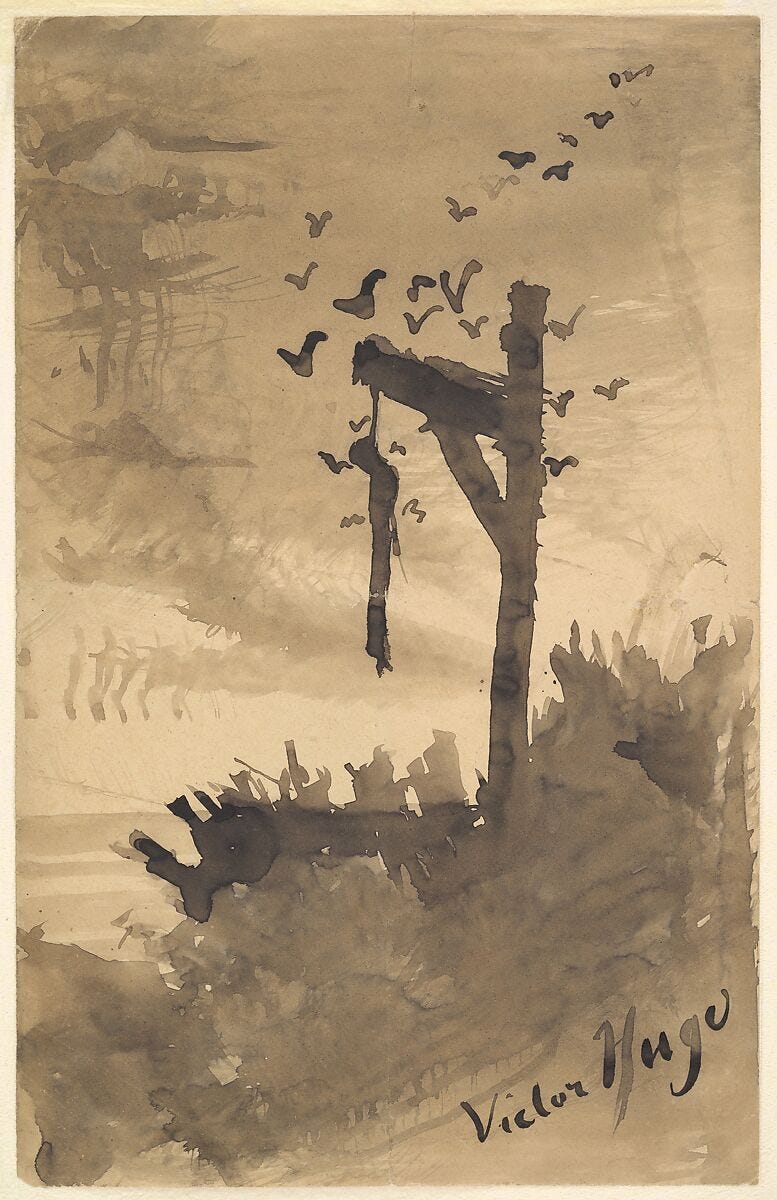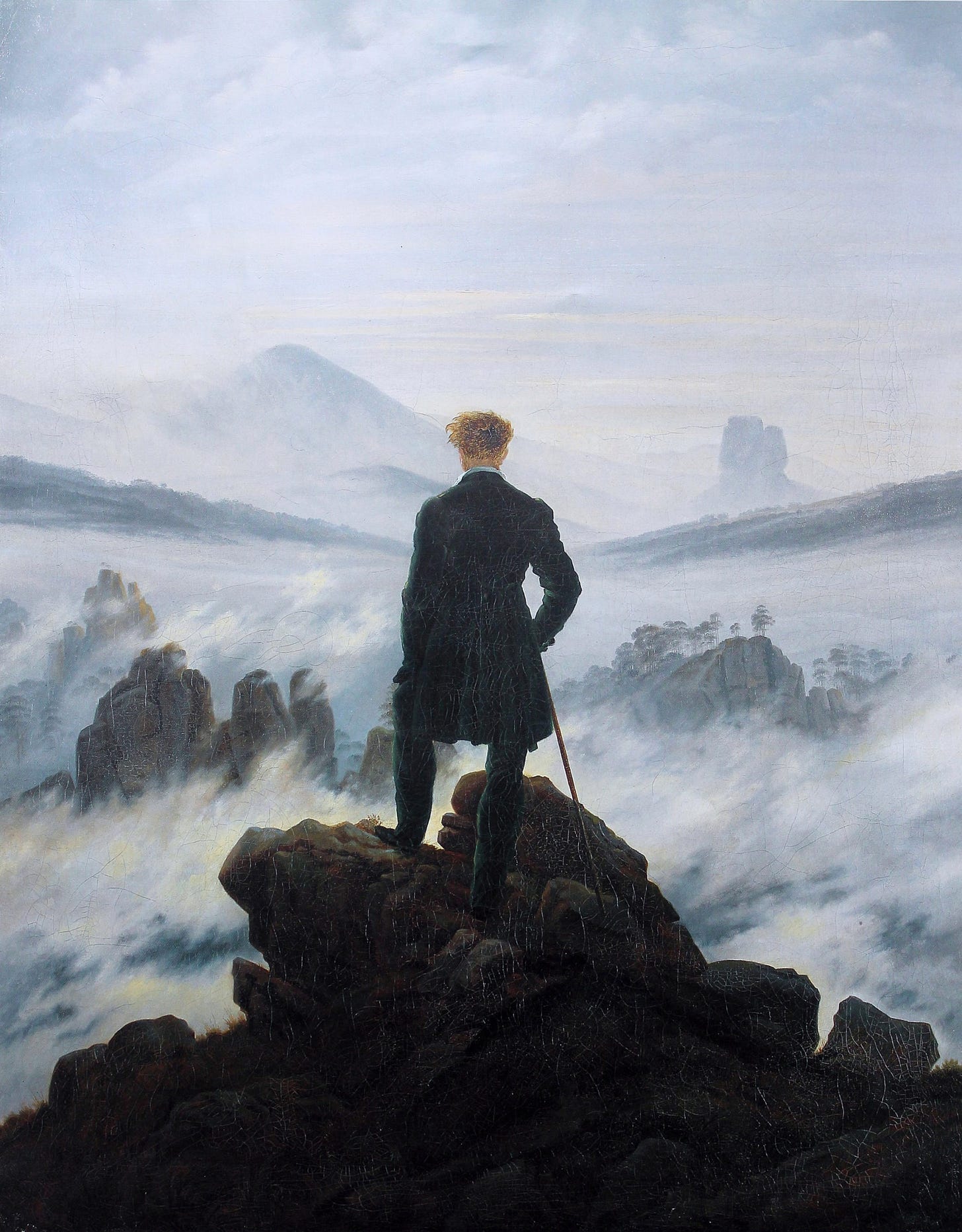Gravity's Rainbow - Part 4 - Chapter 11: To Be Passed Over
Analysis of Gravity's Rainbow, Part 4 - Chapter 11: Tchitcherine by the River, Geli finds Tchitcherine, Two Brothers
Our society has now engineered what we perceive as the natural terrain. It has not used the natural world in the manner it was gifted for but has both destroyed it explicitly and synthesized compounds that would never decompose back into the Earth, and the “Trees creak in sorrow” (733) for this loss. Different passersby of a culvert — a tunnel — left writings and conversations upon them. On the arch — the parabola — the first message was a call to death, known here as ‘Stretchfoot.’ Below it was a “man looking closely at a flower” drawn in “Commando blackface-grease” (733). This grease was likely the same substance that covered the spy disguised as a Zone Herero who Enzian and his group passed by while transporting the 00001 rocket (4.10). Even a spy, working to cut off a subjugated peoples’ retribution, has the subconscious desire to see a flourishing of life. Whether he knows it or not, he is aware that the cracked land, the concrete stretching through plains, the trees burnt to a crisp, are sins against Earth. Other writings in this culvert portray similar veins in the subconscious of a now desolate world: one telling the artist of the above picture to ‘finish’ the drawing, one responding to this command saying that ‘it is finished’ because what else can we do now but stare upon the only glimmer of beauty in a land that is now blackened . . . and another showing a last glimpse of love.
Among all of these last grasps at hope are ones of death. A tic-tac-toe game that was played by a single individual hiding away; a game of hangman where the word ‘GENERATOR’ being incomplete only ended up producing GERAT, inferring the success of Blicero’s project of instilling his purpose among the general population of the world; a picture of a hanged man far at the other end.
It is among this sad battle between hope and death that “the young witch finds Vaslav Tchitcherine at last” (734). The night before, using her unorthodox paganist methods, she cast a spell over him. (Remember that her unorthodox method of finding Tchitcherine is an analogy for the forgoing of traditional methods of fighting back against a system and accepting similarly unorthodox methods). Her tactic was an act of voodoo, saying, “May he be blind now to all but me. May the burning sun of love shine in his eyes forever. May this, my own darkness, shelter him” (734). She needs him but also wants to shelter and protect him from the evils of the world and shelter and protect the world from the evils he has desired, consciously or unconsciously, to enact.
The bread which Geli Tripping baked from the rye that she rolled in (4.9) is still with her. She breaks the bread, eating one piece and giving the other to Tchitcherine. With this, he is entirely under her spell, though being under someone’s spell is not the fully terrifying thought that it is often made out to be. Yes, voodoo and paganism both have the connotation of being evil practices, yet this is largely because anything that goes against the set-up Western order, whether they be in regard to religious, economic, political or other systems, is deemed wrong. But here, it is the only thing that saves the lives of two loved characters.
For, after Geli and Tchitcherine sleep together, lovers once again, Enzian and his crew drive by with “a covered wagon containing the warhead section of the 00001” (734). It is the destined climactic moment, where two brothers, both who have been seeking each other in the name of vengeance, come together — though, it is a vengeance neither of them really had a true reason for seeking. Since first meeting Tchitcherine and Enzian (throughout Part 3), we learned that both knew destiny would find one of them dead at the other’s hands. Yet, here we are. The two exchange some food and cigarettes, not even recognizing the other. Geli’s spell really did make Tchitcherine only have eyes for her. She, in some way, saved the both of them. Death was destined, like the hanged man drawn in grease in the culvert of a war-torn Germany. It lay over the entire world now. But, because Geli decided she would seek a means outside the prescribed way of things, because she saw something beyond the tools that They have provided us with, Hope and Life broke through that destined death. The exchange thus leads to something that will provide one with food, and one with comfort, both with Hope. No, they may never get to see each other again. They may never find the one brother who they had and who they sought. But they will both live: Enzian to go off and hopefully bring some protection to the world, and Tchitcherine, via Geli, to shed light on using tools outside the normal system.
“This is magic. Sure—but not necessarily fantasy. Certainly not the first time a man has passed his brother by, at the edge of the evening, often forever, without knowing it” (735). Magic, here, is the unorthodox. While They want us to believe that what magic can achieve is fantasy, it is not. It may be a difficult path to trod, but it is certainly achievable. Of course, it does not come without its repercussions. It will save us, but we may lose, or possibly never find, someone we love in the process. We may forever stand on the ‘edge of the evening’ eternally, never knowing what it would be like to live in a world where we met that one person who could change us or bring us happiness. Because the world we live in was built to keep us apart.
Up Next: Part 4, Chapter 12
The next chapter is it: the final chapter of Gravity’s Rainbow. It is a long chapter — one that would typically be split into three parts like 3.11 and 4.6 (I think the word count, 12.6k, would actually make it four parts). Instead, I’m going to make it one extra-long post. Since it’ll go over my usual word count, SubStack will probably not allow it to all fit in the email newsletter, so if you usually just read it on email, make sure to open up the link to the actual website to see the full thing.






